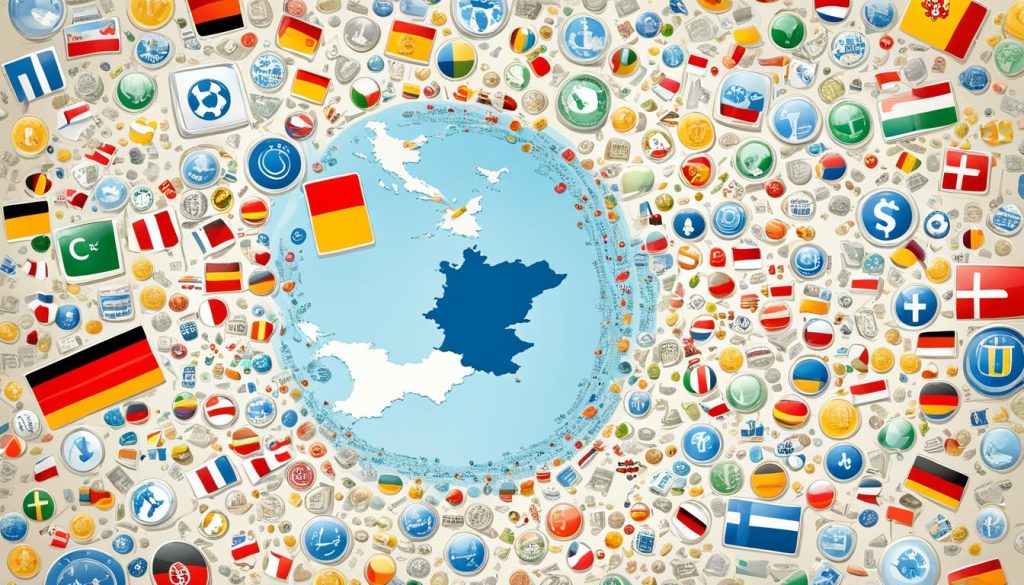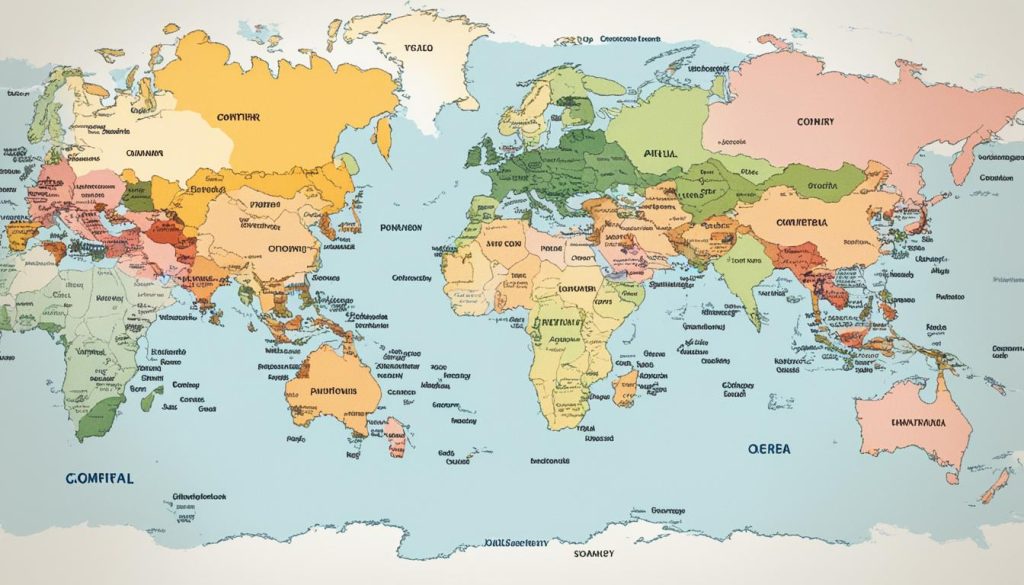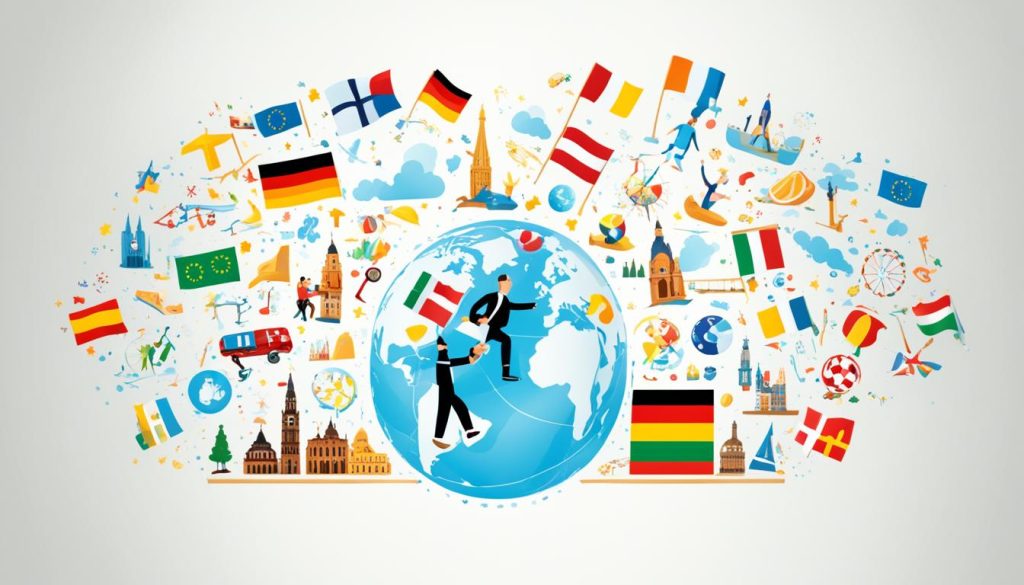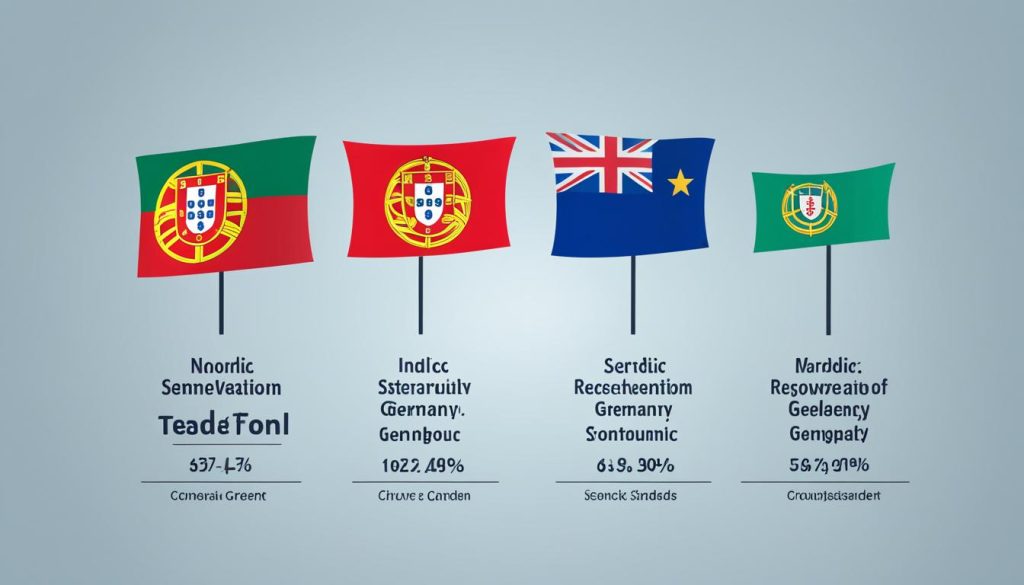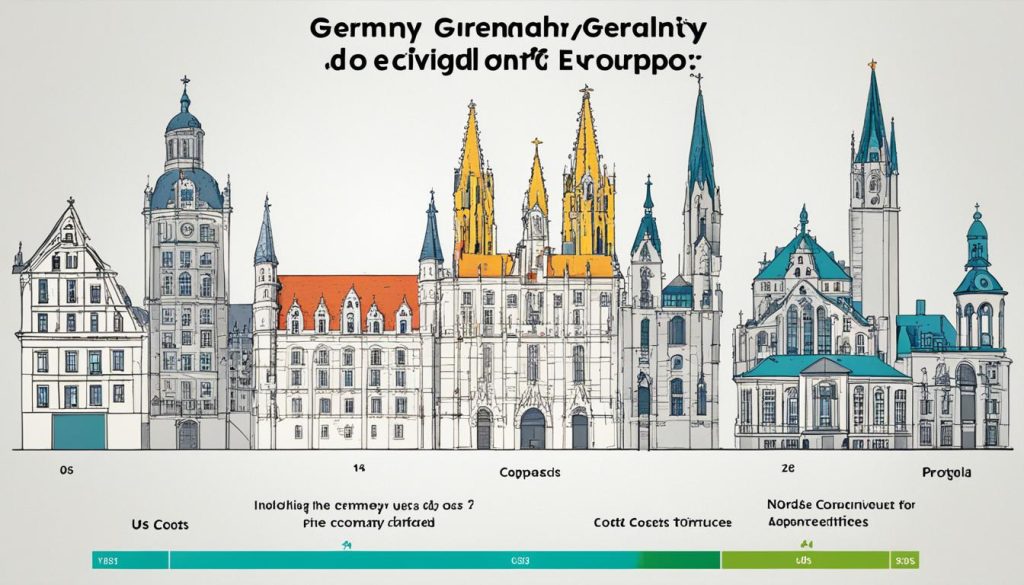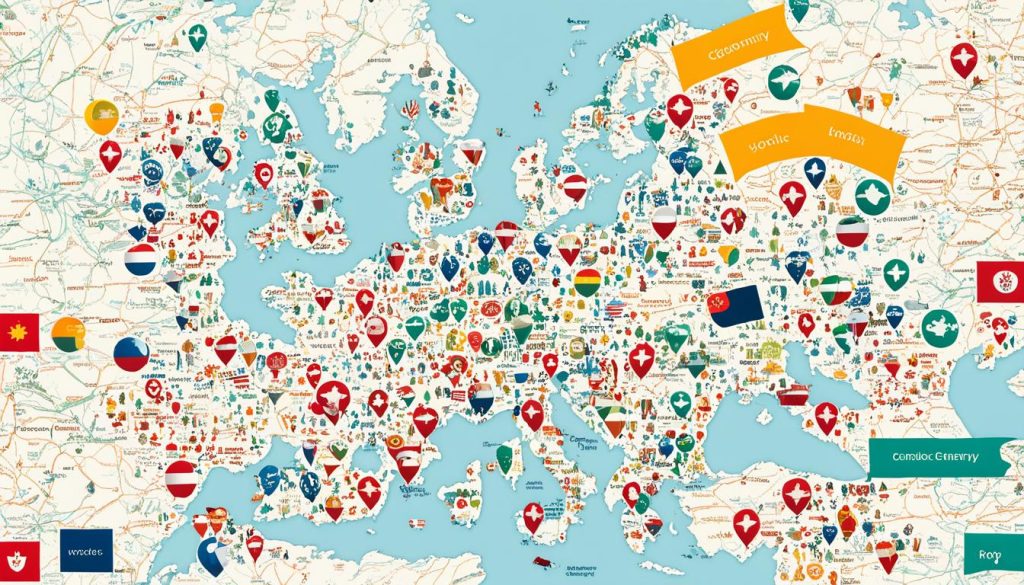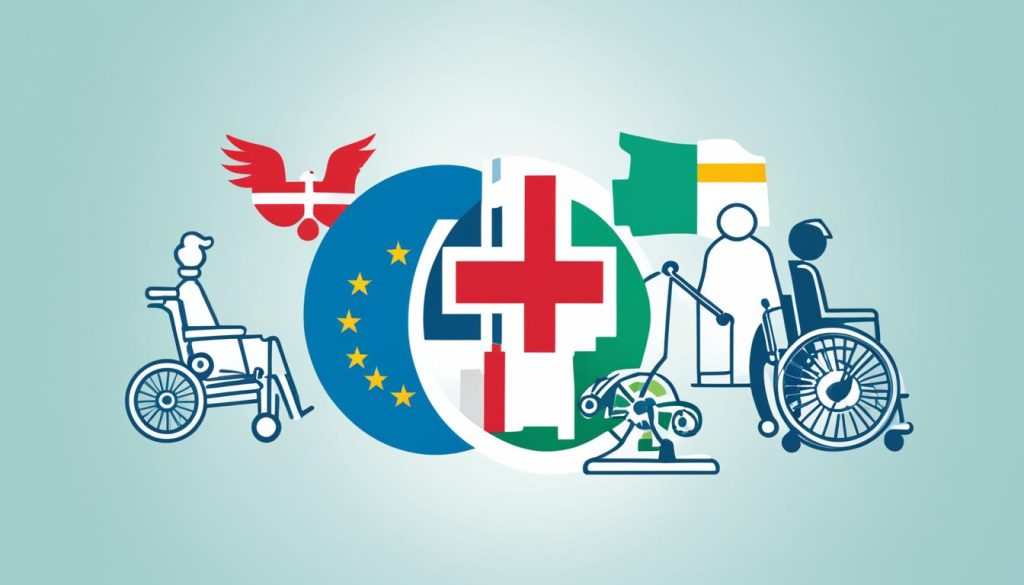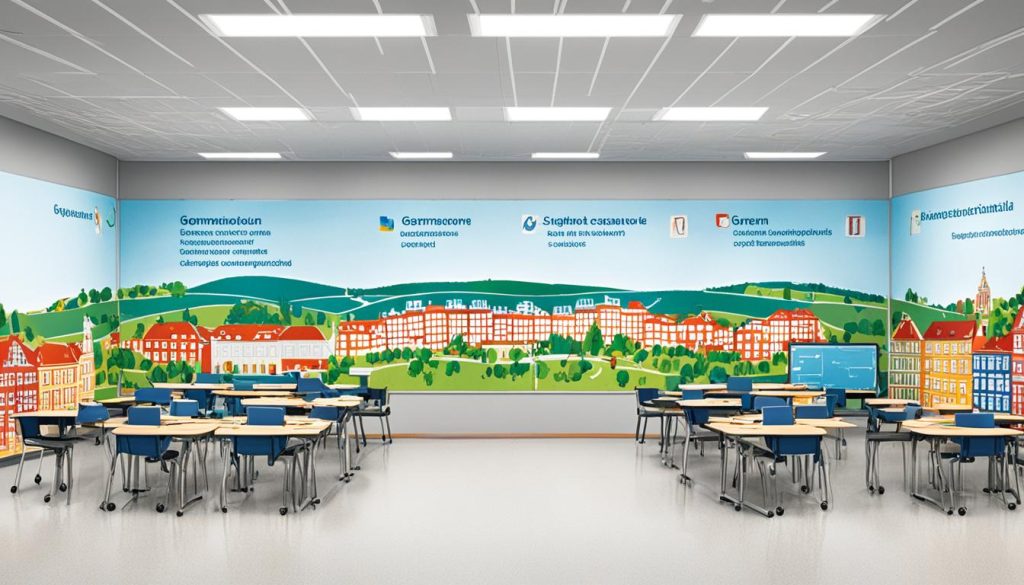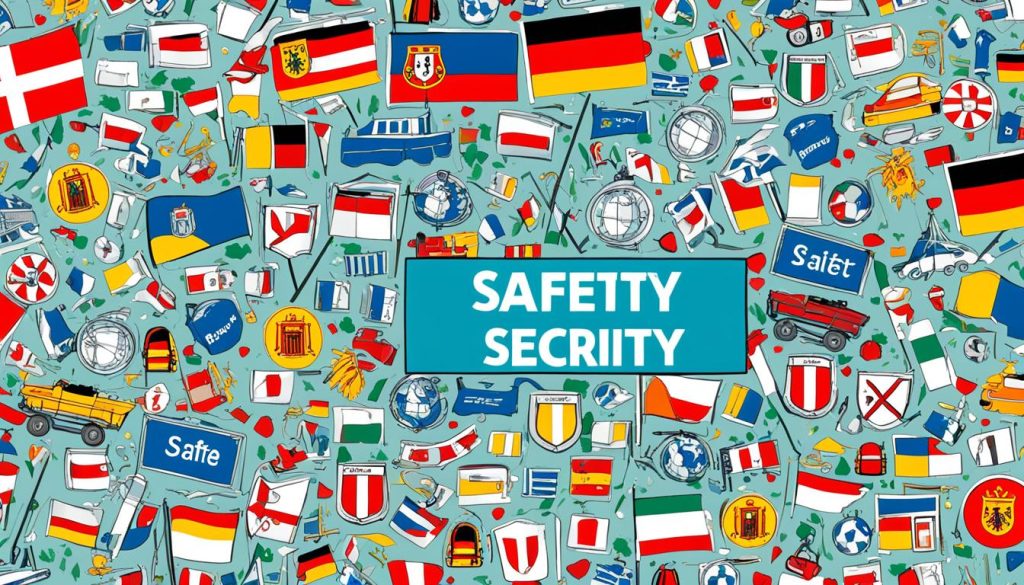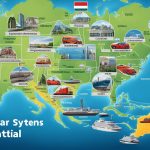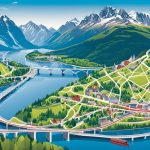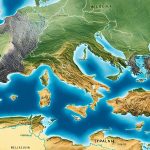Those looking to improve their life have many choices in Europe. From Germany’s strong economy to Portugal’s sunny relaxation and the Nordic countries’ forward-thinking society. This look at European living standards compares money matters, life quality, and what expats will find when they move.
Germany is a leader with a life full of order and timely ways. It’s perfect for those wanting to join its lively and rich culture. On the flip side, Portugal has a relaxed lifestyle with lots of outdoor fun and community feel. The Nordic countries lifestyle is top-notch for social progress and economic strength, appealing to UK expats.
In these Nordic lands, each country has its unique charm. Norway is known for its natural beauty and social care, while Sweden is modern and worldly. Denmark enjoys a calm lifestyle, and Finland is praised for its education quality. These vast differences create a blend of attractive experiences for expats exploring their new European lives.
Many are drawn to new places, trying to match dreams with the real side of Germany vs Portugal quality of life. It’s intriguing for those shifting their lives personally and professionally in Europe’s varied culture.
Understanding Lifestyle Variances in Europe
Europe’s culture is as diverse as its history. Each area has unique influences that shape people’s lives. For expats, understanding local cultures, social habits, and amenities is key to settling in. Exploring lifestyle differences sheds light on Europe’s cultural mix and expats’ social experiences.
Assessing Cultural and Social Influences
To grasp Europe’s cultural impact, note the differing attitudes and behaviours. In Portugal, family and community are highly valued, slowing down the pace of life. In contrast, Germans value punctuality and organisation in both work and private life.
Lifestyle Amenities and Environment
Expats often find the amenities in Europe impressive. Germany’s city parks and the Nordic outdoors offer a great quality of life. Portugal’s outdoor cafés and Denmark’s bike-friendly cities highlight Europe’s commitment to living well.
Expat Community Dynamics
Expat communities can offer comfort or a culture shock. Integration is easier in areas with a big international presence. But in places with close communities and a dominant local language, settling in might take more work. Yet, expatriate life in Europe enriches one’s understanding of self and the world.
Work-Life Balance: Portugal vs Germany and the Nordics
Understanding work-life balance is vital when moving abroad for work. Europe has a wide range of balances, influenced by local values and priorities. We’ll explore how work-life balance differs between Portugal, Germany, and the Nordic countries.
Portugal enjoys a leisurely work environment, reflecting its Mediterranean setting. It values breaks and promotes a relaxed lifestyle. In comparison, Germany employment is formal, valuing punctuality and diligence. This strong work culture boosts its economy.
In the north, Nordic work culture focuses on employee well-being and fairness. Nordic countries support policies for a good work-life balance. This is shown in their high happiness and life quality scores.
- Portugal vs Germany employment: Portugal supports shorter hours and focuses on well-being. Germany emphasizes discipline. This leads to mixed feelings among expatriates, depending on their work-life balance expectations.
- Nordic work culture: Countries like Sweden and Denmark offer innovative work places. They support flexible hours, long parental leave, and trust their employees to work without strict supervision.
The differences in these regions highlight varied approaches to work and leisure. They affect how satisfied people are in their work and personal lives. From Portugal’s sunny afternoons and laid-back pace to Germany’s strict work ethic, and the Nordic focus on equality and personal time, European work-life balance offers a variety of philosophies.
Evaluating Economic Stability Across Countries
In Europe’s shifting economy, growth has opened up different chances for progress. Germany’s skilled workforce is vital, known for its top-notch engineering and contributions to the car and electronics industries. This success story is not just about old industrial leaders; it now also highlights Portugal’s tech surge. Cities like Lisbon and Porto are at the forefront of digital innovation. They have pushed Portugal into the limelight with its fast-growing startup scene.
The story of Nordic economic stability is about great social systems and competitive strengths. Norway, for instance, combines a strong social safety net with wealth from oil. Such wise policies shape their economy and make life better for their people.
- German skilled workforce supporting key industries and market robustness.
- Portugal leveraging its tech boom to fuel economic and job market expansion.
- Nordic nations exemplifying stability with strong societal and economic policies.
- Technological advancements spurring economic growth in European nations.
- Initiatives enhancing business infrastructures and attracting global talent.
- Reforms focusing on improved taxation systems and welfare benefiting local and expatriate communities alike.
Economic growth, skilled labor, and the rise of tech shape regional roles in world economics. The special policies of each area bring global attention, funding, and many job chances.
The Cost of Living Index: A Comparative Analysis
Moving across the Eurozone, many weigh the European cost of living heavily. Each country shows unique financial factors and wider economic stories. Looking into Germany and Portugal, we see the real effects on finances, covering housing to coffee costs.
Housing Market Trends
The housing market comparison between European countries varies greatly. In Portugal, housing is more affordable, offering the beauty of coastal towns and historical cities like Lisbon and Porto. Meanwhile, Germany’s housing, though more expensive, is high-quality and sustainable, particularly in Berlin and Munich.
Everyday Expenses: Food, Utilities, and Transport
In daily expenses, Germany finds a balance of cost and quality, where public services and utilities are efficient but pricier. Portugal, in contrast, shows lower costs for eating out, groceries, and transport. This difference shows the Germany vs Portugal living costs. Lower prices in Portugal support a desirable lifestyle for locals and expats, highlighting how daily costs affect living abroad.
Job Market Prospects: Opportunities and Challenges
The job market in Europe keeps changing, offering lots of career opportunities and some employment challenges. For those looking for jobs in Germany, Portugal, and the Nordic countries, it’s key to understand each area’s unique features. This knowledge helps in finding jobs more effectively.
In Germany, there’s a huge need for people skilled in technology and engineering. This is because Germany values precision and tech progress highly. Portugal, on the other hand, is becoming a key place for jobs in tech and digital marketing. It’s gaining attention for being innovative in the digital space.
The Nordic countries are known for their focus on innovation and high life quality. They attract skilled workers in various fields, especially those who care about the environment and community wellbeing. Despite the attractive features, there’s a common challenge in these areas: the need to know the local language. Knowledge of German and Portuguese is crucial in Germany and Portugal, respectively. However, the Nordic countries are less of a challenge because many people speak English well there.
- Nurturing local language skills for better integration into the German and Portuguese job markets.
- Identifying sectors that are burgeoning with career opportunities, like the tech industry in Portugal, and aligning skillsets to match.
- Leveraging high English proficiency in the Nordic countries to enter diverse job sectors.
- Exploring networking avenues and social media platforms to foster professional relationships.
- Engaging with local businesses and communities to understand and adapt to the regional economic climates and work cultures.
To improve job chances in Europe, being proactive is vital. Understanding cultural and linguistic differences is key too. This approach helps tackle employment challenges and seize the many career opportunities out there.
Healthcare Systems: Quality of Services and Accessibility
An in-depth look at European healthcare systems shows clear differences. When we compare Portugal vs Germany healthcare, Germany stands out. It’s known for efficiency and a wide range of services. This system makes sure many people can easily get care. Portugal’s model is also effective, offering good health services widely, even in remote areas.
On the other hand, Nordic countries’ medical services are available to everyone. They ensure all citizens get top-quality healthcare. This approach improves life expectancy and makes citizens happy. It makes the Nordic countries leaders in worldwide healthcare standards.
- German Public Healthcare: A model of efficient and comprehensive care with a wide network of hospitals and doctors.
- Healthcare in Portugal: Offers a blend of public and private services, known for its affordability and growing health tourism industry.
- Nordic Healthcare Excellence: The universal healthcare model underpins the region’s approach, fostering innovation and a strong primary care system.
However, these systems all face their own problems. They are working on these issues to remain effective and deal with an ageing population in Europe. Understanding the details of European healthcare systems helps us see which country might fit someone’s health needs best. It matches up to what they expect from healthcare and their lifestyle.
Educational Standards and Public Infrastructure
The public services in a country reflect its future goals and investments. In education and infrastructure, there’s a big difference seen across Europe. A look at European education standards and public infrastructure comparison shows differences between Germany and Portugal, as seen in international rankings.
Germany shows its focus on education through the success of its public sector. This has put it high in international rankings. The country offers various educational chances. Nearby, Nordic countries like Finland are known for their top-notch education systems globally.
Comparing International Education Rankings
Germany is praised for its educational system and public services. Meanwhile, Portugal’s universities are gaining world attention. They show a big improvement in European education standards. This rise improves national pride and global academic conversations.
Transportation Networks and Digital Infrastructure
Looking at infrastructure sheds light on a country’s growth. Germany’s transport system enhances its reputation in public infrastructure comparisons. Nordic countries focus on digital innovation, keeping their infrastructure modern. This keeps them ahead in the digital age.
Looking at all factors, the variety in public services and education in these countries benefits locals and expats alike. It also impacts personal and job growth, making life better for everyone when comparing Germany vs Portugal education.
Government Policies and Their Impact on Expatriates
Understanding how laws affect expat life is crucial. In Europe, tax laws, immigration rules, and residency permits affect those living abroad. Germany, the Nordic countries, and Portugal each have their own set of rules that can help or challenge expats.
Fiscal Policies and Taxation
Europe has a mix of tax policies. Expats think a lot about taxes to make the most of their earnings abroad. Germany has a detailed tax system that supports business but needs strict following.
In contrast, Nordic countries have higher taxes that pay for their great public services. This is a fair trade for many, due to the quality of life there. Portugal offers great tax benefits for expats, like the Non-Habitual Resident status, which cuts taxes and draws people from all over.
Immigration and Residency Laws
Immigration laws in Europe are key for expats to live and blend in. Germany’s laws are strict but open doors for skilled workers. Nordic countries welcome diversity, and their laws reflect this by making it easier for international talent.
Portugal aims to be a top choice for expats with different permits and visas. Its laws are friendly, making it easy for people to move and settle there.
Looking at these areas shows how important government policies are for expats in Europe. Keeping up with the changes in laws and permits is essential for anyone wanting to move to Europe.
Safety and Security: A Comparative Overview
Moving across borders brings European safety to the forefront. It shapes choices for people and families. Europe mixes its rich history with modern progress. It provides a safe haven, ranking high in global country security comparison studies. This section looks into Europe’s safety and security, especially for expatriates seeking a secure life.
Germany is known for its strong economy and safety. It has low crime rates and effective law enforcement. Expatriates value Germany’s safety protocols, making it a model of stability in Europe.
Portugal is famous for its safety as much as its coastlines. With low crime rates, expatriate safety is assured. The country’s peacefulness attracts those looking for calm and beauty.
The Nordic countries lead in peace and security worldwide. They often top rankings for their low corruption and safety. They offer a serene environment, welcoming expatriates into their supportive society.
- Germany: A beacon of safety with organised systems protecting residents.
- Portugal: Known for its peaceful lifestyle and minimal crime.
- The Nordics: Peace pioneers with a focus on community security.
Safety touches every aspect of life. It’s felt from Berlin’s parks to the Algarve’s shores, from Norway’s fjords to Finland’s forests. This safety boosts the quality of life for residents.
- Enjoying communal spaces without fear strengthens society.
- Peaceful environments encourage work and personal growth.
- Stellar safety records make these countries top choices for expatriates.
Europe’s security shows its commitment to heritage and resident well-being. This overview showcases a continent where safety and security are fundamental. It makes Europe an attractive option for expatriates from everywhere.
Cultural Richness and Heritage
Europe’s cultural tapestry mixes many traditions. Each nation shares its own tale through music, art, and long-standing customs. Emblematic festivals and historical sites highlight its collective identity. This influences not just Europeans but people worldwide.
Festivals and National Celebrations
In Europe, festivals brighten the year. Germany’s Oktoberfest draws beer fans and culture enthusiasts to Munich. In Portugal, festivals like Lisbon’s Santo António light up the streets with colour and sound. These events connect communities, delighting locals and visitors.
Arts, Museums, and Historical Sites
Europe guards priceless art and history. Its cities boast architectural wonders, like Germany’s Cologne Cathedral. Nordic countries add to this richness with innovative designs. Copenhagen and Stockholm showcase this through modern art and museums.
- In Germany, UNESCO Sites like Bamberg show off its cultural roots.
- Portugal’s Jerónimos Monastery highlights its exploratory past.
- The Nordics blend ancient and modern, enriching culture.
These countries preserve and evolve their artistic heritage. They safeguard Europe’s cultural beauty for the future. By doing so, they invite everyone to celebrate our shared achievements.
Leisure Activities and Social Opportunities
Europe’s lively social scene features lots of fun activities for expats. They can make friends and enjoy themselves through various events. From festivals to outdoor adventures, Europe has much to offer for relaxation and making connections.
In Portugal, expats love playing beach volleyball and having BBQs by the sea. These events help newcomers bond and form friendships. The area’s many local festivals are perfect for meeting people and enjoying the culture.
In Germany, people come together in city parks for music, food, and craft fairs. This country’s vibrant arts scene also brings expats and locals together. Gallery openings and theatre shows are great places to socialise.
The Nordic countries offer activities that bring people closer to nature, like hiking and skiing. These places value environmental care, and their community events often encourage sustainable living.
- Outdoor Adventures: Kayaking, mountain climbing, and urban gardening
- Cultural Experiences: Museum tours, art workshops, and film festivals
- Social Gatherings: International meetups, language exchanges, and culinary clubs
- Community Participation: Volunteering, local sports leagues, and charity events
Expats find it easy to make friends in these varied settings. This helps them feel at home in Europe and enjoy its culture fully. Such activities are key for expats to settle in and be happy.
Quality of Life Indices: Where Do These Countries Stand?
Nordic countries, Germany, and Portugal show how well-being varies across places. These countries are often in reports about expatriate life quality. The World Happiness Report praises the Nordic areas for their social support and freedom.
Expatriates enjoy strong community trust and respect here. This helps everyone get along and support each other.
Analysing Global Life Satisfaction Reports
Germany is known for its efficiency. This is seen in its high living standards and strong economy. Expatriates in Germany experience well-organized public services.
Portugal, on the other hand, is loved for its mild weather and community life. Here, happiness comes from a slower, friendlier living style. This gives a special view of joy in Europe.
Environmental Factors and Wellbeing
Clean environments are key to happiness. Things like clean air, green spaces, and sustainability efforts make a difference. These factors improve everyone’s health and mood.
This connection shows in wellbeing reports. They tell us that a healthy planet means happier people. Expatriates often move to these European places for a better, calmer life.
